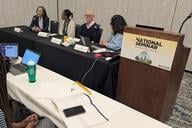You have /5 articles left.
Sign up for a free account or log in.
The introduction of quotas to get more women onto university recruitment committees in France has backfired and has actually led to far fewer female academics being hired, new research has revealed.
A male backlash against the equity measures is the most likely reason for the decline in female recruitment, according to analysis by Pierre Deschamps, an economist at Sciences Po, in Paris.
 He investigated recruitment data from 455 hiring committees across three French universities in the years before and after the introduction of the requirement for recruitment committees to draw at least 40 percent of their membership from each gender.
He investigated recruitment data from 455 hiring committees across three French universities in the years before and after the introduction of the requirement for recruitment committees to draw at least 40 percent of their membership from each gender.
Deschamps’ modeling indicates that, had the quotas not been introduced, 38 percent more women would have been hired. “That’s enormous,” he said.
Nor have the quotas yet encouraged any more women to apply for positions, according to “Gender Quotas in Hiring Committees: A Boon or a Bane for Women?” a working paper from Sciences Po’s Laboratory for Interdisciplinary Evaluation of Public Policies.
“The reform has a large, significant and negative effect on the hiring of women,” it concludes.
This could be due to a backlash against the quotas by men, the paper says, with some academics postulating that “men discriminate against women when their identities are threatened.”
Only on hiring panels led by men did recruitment decisions swing away from female applicants after quotas were brought in, explained Deschamps. “It’s men that are changing their behavior as a reaction to the reforms,” he said.
It could also be that some men felt the quotas gave them a license not to make any “special effort” to recruit women any more, he said. Or perhaps they felt that they were already “doing their best” but got “angry” at the imposition of quotas, he suggested.
These latest findings from France tally with earlier research using data from Italy and Spain, which also found that more women on an appointment panel did not boost female applications. Nor were women more likely to vote for female applicants -- and male evaluators become less favorable to women when female evaluators joined the selection committee, according to “Does the Gender Composition of Scientific Committees Matter?” published in American Economic Review in 2017.
Some other countries have taken similar measures to France. In the Republic of Ireland, universities are working toward having at least 40 percent men and 40 percent women on appointment committees.
But Deschamps argued that the lack of women in senior positions was more likely to be due to a lack of applicants, rather than the hiring process itself. “I think there might be other ways of solving the underrepresentation of women” than appointment committee quotas, he said.
Christina Ullenius, former rector of Karlstad University and a founding member of the European Women Rectors Association, said that the results from France were “disappointing but not totally unexpected.”
“It has always taken some time before my male colleagues have adjusted and regarded me as a colleague rather than an odd woman,” she said. Still, quotas on hiring committees should still be used to “shed light on the hiring process and to push for change,” in combination with training for evaluators, Ullenius argued.




